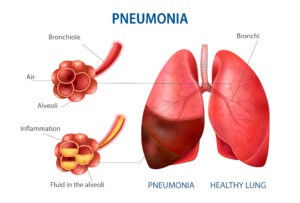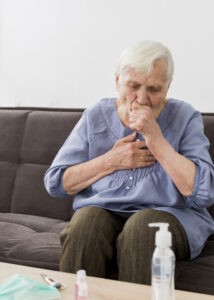by Mariah Lillie, RN, BSN, Senior Services Volunteer
Adults over the age of 65 and those with chronic health conditions or smokers are at high risk of pneumonia and its complications, many requiring hospitalization. The Centers for Disease Control and Prevention (CDC) found that over 1.4 million individuals visited the emergency department with pneumonia due to an infectious organism (or germs) in 2021.
If you are at high risk of pneumonia and its complications, it is important to be aware of how to keep yourself from getting severely ill and requiring hospitalization.

What causes pneumonia?
Pneumonia is an infection of the lungs caused by germs, like viruses, bacteria, or fungi. The most common germs that cause pneumonia are:
- Influenza Virus – common “Flu” virus
- Respiratory syncytial virus (RSV) – a common cold virus
- COVID-19 virus
- Pneumococcus bacteria
How do you prevent pneumonia and complications?
1. Get recommended immunizations
The CDC recommends vaccines for COVID-19, influenza, pneumococcal disease, and RSV to prevent pneumonia. By boosting your immune system with immunizations, you can help your body fight pneumonia if you do get it.
2. Wash your hands
Get in the habit of washing your hands with soap and water or hand sanitizer to prevent germs from spreading and entering your body, especially:
Before and after eating
- After using the bathroom
- After returning home from public places
- After coughing, sneezing, or blowing your nose
- Keep hand sanitizer in easy-to-reach/frequented places to remind you to wash your hands, like on end tables, your purse or bag, or by a box of tissues.
3. Brush your teeth
The US Department of Veteran Affairs has conducted multiple studies that found better oral hygiene practices can prevent pneumonia. Keeping your mouth clean prevents germs that may be in your mouth from entering your lungs. Brush your teeth at least twice daily, especially when you are sick, to keep germs from building up in your mouth and entering your lungs.
4. Quit Smoking
Smoking irritates the respiratory tract and can put you at high risk for severe disease due to pneumonia. It also puts you at high risk for diseases like COPD that may further increase risk of hospitalization due to pneumonia.
 What are signs and symptoms of pneumonia?
What are signs and symptoms of pneumonia?
You may start with mild cold and flu-like symptoms caused by a virus, such as COVID-19, RSV, or influenza and it may progress to pneumonia. Some people have severe symptoms right away. The signs and symptoms of pneumonia include:
- Cough, often producing yellow, green, or bloody mucus
- Fever and chills
- Shortness of breath
- Sharp chest pain when breathing deeply or coughing
- Loss of appetite, low energy, fatigue
- Nausea and vomiting
- Confusion, especially in older individuals.
When should you call your doctor?
Call your primary doctor when your symptoms start, even mild ones, especially if you are in a high-risk group (age over 65, and/or those with underlying health conditions). If you have a virus that can cause pneumonia, your doctor may want to start medical treatment right away. Do not wait until you are severe.
When should you go to Urgent Care or the Emergency Room?
Go to urgent care if you have symptoms of pneumonia and your primary doctor is not available, such as on weekends or after hours.
If your symptoms become severe, such as:
- Severe shortness of breath, unable to catch your breath
- Rapid breathing
- Bluish color in your lips and/or fingertips
- Worsening/constant chest pain
- High fever
- Confusion
- Seek emergency care right away.
References
American Lung Association. (2023). Preventing Pneumonia. Retrieved from https://www.lung.org/lung-health-diseases/lung-disease-lookup/pneumonia/preventing-p neumonia#:~:text=Adults%2065%20and%20older%20should,their%20health%20condition(s).
Centers for Disease Control and Prevention – National Center for Health Statistics (2023). Fast Facts – Pneumonia. Retrieved from https://www.cdc.gov/nchs/fastats/pneumonia.htm
Centers for Disease Control and Prevention. (2022). Pneumonia: An Infection of the Lungs. Retrieved from https://www.cdc.gov/pneumonia/index.html
U.S. Department of Veterans Affairs. (2019). VA research in action: Oral hygiene to fight pneumonia. Retrieved from
https://www.research.va.gov/research_in_action/Oral-hygiene-to-fight-pneumonia.cfmOral-hygiene-to-fight-pneumonia.cfm

